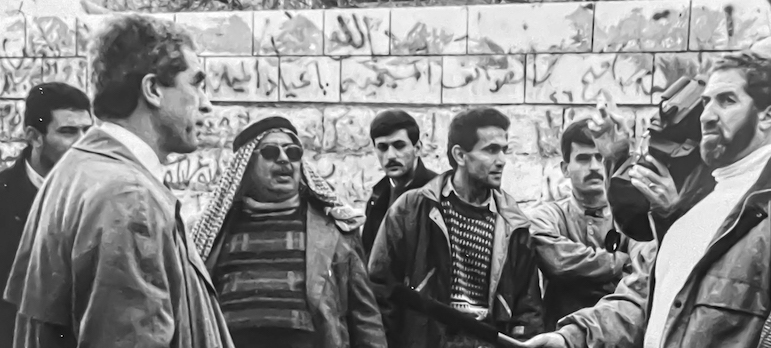In between sweeping scenes above the rooftops of Jerusalem—beyond the golden Dome of the Rock and the Western Wall’s limestone ashlars—cameras capture images of men, women and children living amongst barbed wire, assault weapons, protest signs and megaphones, documenting Palestinians and Israelis’ struggle to call the land home.
Watching news headlines in recent months, Bob Gliner, a documentarian and San Jose State University professor emeritus of sociology, realized these same clips also appear in “Jerusalem: The Bridge to Peace,” a documentary he helped produce three decades prior.
Upon this realization, he hastily dug up, dusted off and delivered the original 1991 tapes to be digitized.
“I wanted to bring the show back out because it's only gotten worse—the only thing that’s changed is the timing,” Gliner says.
“Jerusalem: The Bridge to Peace” will now re-air this week on KQED—30 years after the one-hour special first ran on KTEH, San Jose’s public access television station at the time.
Roy Gordon, a Palo Alto-based organizer turned-interviewer, says the memories captured in the film remain acutely relevant without permanent resolutions in sight.
“The goal was really to find out what people were thinking, whether people had hope for solutions to the problem and whether people were trying to make things happen, or whether they were just watching things happen,” Gordon says, noting that passersby were almost always willing and anxious to speak. “We weren’t trying to make a documentary about the conflict. We were trying to make a documentary about the impact the conflict was having on the two societies.”
In between nights spent resting at the YMCA in Jerusalem, Gliner’s lightweight camera captured more than 60 hours of footage as half a dozen Bay Area volunteers arranged meetings with Palestinian and Israeli figure heads and civic leaders, as well as a slew of man-on-the-street interviews in Israel and the West Bank over the course of two weeks in January, 1991.
“When you actually see somebody talking, it contextualizes the words and messages the person is saying—hearing the anger in their voice and seeing their eyes and gestures,” Gliner explains. “That’s the career I’ve had: get people to open up about their situations, possibilities and what role people can play to help to solve issues of social justice and international conflict.”
“Bridge to Peace” sprouted out of the organization Beyond War—known today as Foundation for Global Community—established by a small group of ordinary people in Palo Alto who decided to try to make a change in the world.
The group brought together eleven prominent Palestinians and Israelis—sourced from years of tireless interviews with community members—to the small town of Ben Lomond, tucked away in the Santa Cruz Mountains, for five days of circle discussions and communal living with one goal in mind: develop a peace agreement.
The conference allowed for people to meet, share personal stories and coexist peacefully outside of the Middle East. Even moments as mundane as washing dishes together allowed an Israeli general and a Palestinian liberation officer to realize they faced each other in battle.
“It was an incredible experience for both of them, and it totally humanized the conflict,” Gordon says. “There is a desire on both sides to end this, but nobody knows how to do it or what it takes—it’s a very challenging thing.”
Gliner agrees: “The fact that they were able to come here to California and work out this peace agreement shows that peace is possible.”
But the duo admit playing the film back 30 years later is also tragic, seeing that more hasn’t changed.
Gordon hopes that viewers witnessing the issues seen in modern headlines and social media feeds situated decades earlier will impart an increased urgency to work together—a lesson even more critical today alongside climate change, poverty and the pandemic.
“For the sake of the young people, we have to provide them with a place and an environment that is helping them grow rather than helping them grow apart,” he says. “That’s the reality in Israel, and it’s the reality on the whole planet now: if we can’t work together with others, we will not survive.”
“Jerusalem: The Bridge to Peace” airs Monday night, Sept. 13, at 11pm on KQED, Sept. 14 at 5:00am, and on KQED Plus on Sept. 23 at 4pm, and Sept 25 at 7:30am.


Israel continually shows its resistance to justice for Palestinians and is an undemocratic Apartheid state. Is there any real question about that?
This story was published in September 2021.
Says you, I assume you’re an American? Living on a land belonging to indigenous people. Just another antisemite with an agenda?